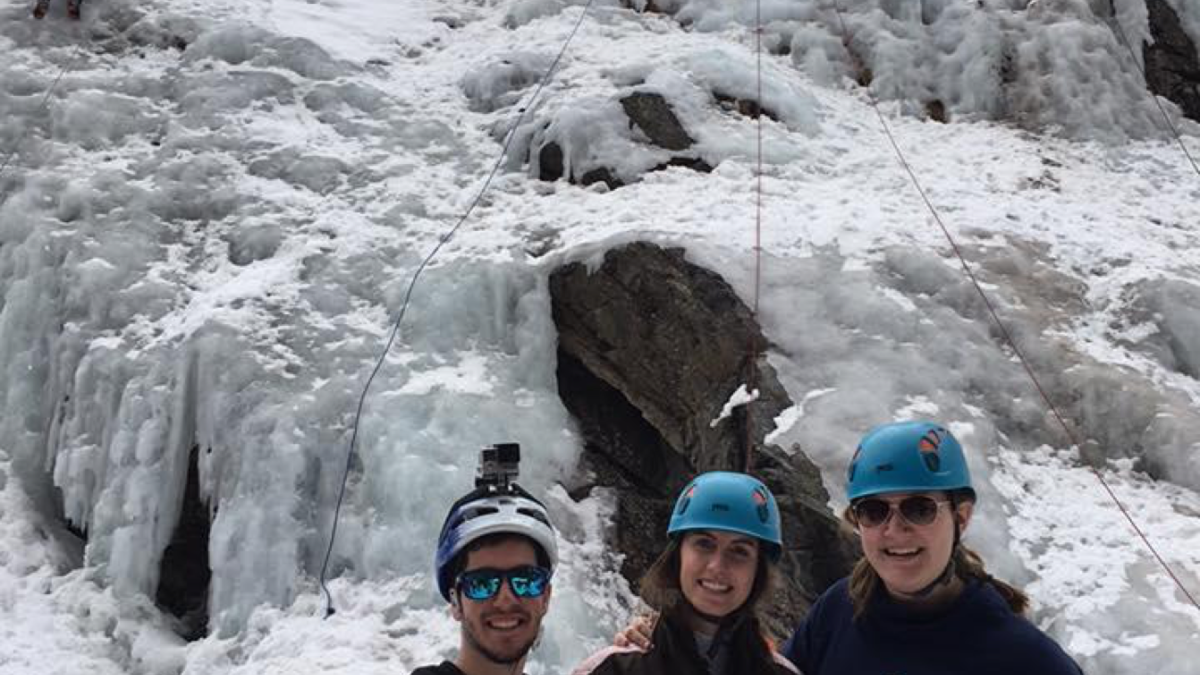Adaptive ice-climbing excursion heats up ASU engineering capstone thinking

Biomedical engineering juniors (from left) Shawn Womack, Rene Reynolds and Shelby Martin show Sun Devil pride as volunteers at an ice-climbing event hosted by Paradox Sports in Ouray, Colorado. Their experience will be the basis and inspiration for their upcoming senior-year capstone project. Photo courtesy of Stephen Helms Tillery
Why should students wait until their senior year to start thinking about the culminating project of their undergraduate experience?
Biomedical engineering professor Stephen Helms Tillery saw an ice-climbing event as a good opportunity to excite junior-year students about their upcoming capstone project.
The event, hosted in Ouray, Colorado, by Paradox Sports from Feb. 26-28, was an adaptive ice-climbing event, meaning that all of the participating climbers had a disability — ranging from amputations to traumatic brain injuries.
Helms Tillery and his wife wanted to attend the event out of their own interest, but then had the idea to include students on their three-day journey.
Helms Tillery invited three biomedical engineering juniors — Shawn Womack, Rene Reynolds and Shelby Martin — in hopes that the experience would be the basis for their capstone project the following academic year.
“We’re trying to enable students to take off running with their projects right at the start of their senior year,” said Helms Tillery.
The students volunteered at the event by helping to belay athletes, set up for events, and transport food and equipment. They also had the opportunity to interview and interact with the adaptive athletes, meet the founder of Paradox Sports and become acquainted with some of the businesses that produce adaptive climbing gear.
For the students, learning from and interacting with the participants was the most informative part of the experience.
“Their attitudes amaze me the most because most people think that [a disability] would get you down … but these athletes get up and go do outstanding, challenging activities, like ice climbing,” said Womack, who is also pursuing a minor in business administration.
“The participants don’t let their disability define them,” said Reynolds, adding, “These are the people I want to dedicate my life to helping out.”
Martin, who is just starting to figure out what area within biomedical engineering she would like to pursue in her career, said the event “opened my eyes to the field of prosthetics and adaptive athletics.”
Martin also felt particularly drawn to the participants, many of whom were wounded veterans, because her father served in the United States Army for more than 20 years.
Reynolds said the trip “provided a huge head start” to their capstone project.
“We had no real agenda,” said Helms Tillery. “The goal was to spark the students’ imaginations as they became better acquainted with the world of adaptive devices and prosthetics.”
This approach worked.
The group is currently narrowing down a list of ideas to tackle for their capstone project in the fall semester.
The team is interested in examining the unfortunate rigidity of some of the current prosthetic designs, including exploring the possibility of improved socket design to allow for enhanced movement in leg and arm prosthetics.
The team is also considering the possibility of implementing a pneumatic system in the amputated area. “A gas spring could activate or compress with applied weight to allow more movement and act more like a physiological leg,” said Womack. This device could improve control over body movement for those with neurological disorders.
Helms Tillery, an expert in neuroprosthetics, intends to mentor the students throughout their capstone project.
“It means the world to me … [that] Dr. Helms Tillery dedicated his time to helping and mentoring us. He really went above and beyond as a professor to provide this amazing opportunity,” said Reynolds.
Womack reflected on the experience, saying, “I think we are better prepared to tackle our senior year and capstone because we now have an idea of what we would like to solve, and we have seen up close and personal how these individuals are affected by these devices every day.”
For Reynolds, the trip also confirmed that she chose the right field of study in biomedical engineering, which she said offers “the technological side of helping people.”
View a video of the 2016 Paradox Sports event and learn more about Paradox Sports.
More Science and technology

ASU postdoctoral researcher leads initiative to support graduate student mental health
Olivia Davis had firsthand experience with anxiety and OCD before she entered grad school. Then, during the pandemic and as a…

ASU graduate student researching interplay between family dynamics, ADHD
The symptoms of attention deficit hyperactivity disorder (ADHD) — which include daydreaming, making careless mistakes or taking…

Will this antibiotic work? ASU scientists develop rapid bacterial tests
Bacteria multiply at an astonishing rate, sometimes doubling in number in under four minutes. Imagine a doctor faced with a…